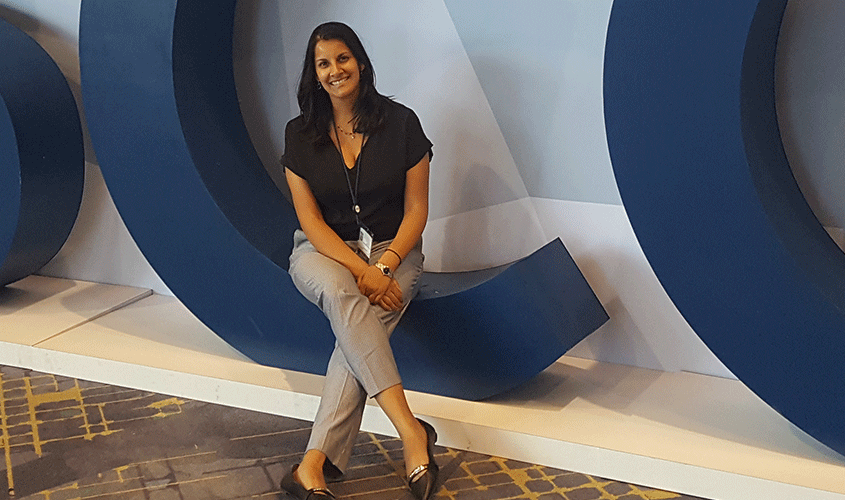World Cancer Day takes place on February 4, and the theme for 2022 through 2024 is “Close the Care Gap,” working toward ensuring equitable access to cancer care from diagnosis to treatment. The initiative was started in 2000 by the Union for International Cancer Control as an opportunity to raise awareness for the disease and to encourage its prevention, detection, and treatment. But how can society contribute to its mission?
St. George’s University alumna Preeti Narayan, MD ’12, one of the leaders of the breast/gynecologic malignancies team in the Division of Oncology 1, Office of Oncologic Diseases at the Food and Drug Administration, has some ideas.
“Cancer has likely touched all our lives in some way or another,” said Dr. Narayan. “If you know someone affected by cancer, take some time to reach out and check how they are doing. If possible, offer to run an errand for their family or drive them to an appointment. However, I hope we all can remember to do these things anytime during the year, not just on World Cancer Day.”
Dr. Narayan provided insight into how we can contribute to World Cancer Day’s mission of closing the care gap and stresses the importance of education.
“Unfortunately, despite all the progress made for cancer treatment over the last few decades, inequities in cancer care delivery still exist across the world and within the United States for access to quality cancer care,” said Dr. Narayan. “Everyone can learn more about barriers to care to understand the challenges {of the disease} better and empower us to educate others.”
Daily habits to reduce cancer risk from Dr. Narayan:
1. Don’t smoke
2. Make time for exercise
3. Eat a well-balanced diet
THE PATH TO ONCOLOGY
Dr. Narayan is at the forefront of cancer treatment in her work with the FDA and is passionate about advancing this cause. The Division of Oncology 1, for which Dr. Narayan is part of the team that leads the breast/gynecologic malignancies team, regulates investigational new drug applications, new drug applications, and biologic licensing applications for breast, gynecologic, and genitourinary cancers, as well as supportive care (non-hematologic) products. However, she didn’t always know this was her career path, deciding to pursue oncology during her internal medicine residency at SUNY Health Science Center at Brooklyn after graduating from SGU’s School of Medicine.
“At that time, I was doing a rotation in oncology, and my experiences working with patients with cancer resonated with me and also seemed to bring together my past research experience and interest in cellular signaling pathways involved in cancer,” Dr. Narayan said. “One of the patients I rounded on at that time was a young mother with late-stage breast cancer with leptomeningeal disease. Unfortunately, she ultimately needed hospice care, but the experience of being part of her end-of-life care during that difficult time had a profound impact on me and on my decision to become an oncologist.”
Although Dr. Narayan found her path to oncology after medical school, she gained valuable experience in global medicine at SGU, starting from her first days as a student, which helped shape her career at the FDA.
“Learning from faculty and fellow students with such diverse backgrounds and experiences was very rewarding and broadened my interest in policy and equity in care, which is related to aspects of my career today,” Dr. Narayan added.
Throughout her career, from the decision to explore her interests before entering medical school to being curious about different career opportunities for oncologists after graduation, Dr. Narayan has remained open to new experiences. Looking back, she sees these as being some of her most formative decisions and recommends the same mindset to aspiring physicians.
“All your experiences can contribute to your learning and lead to career opportunities in the future that you may have never considered,” said Dr. Narayan. “There are many career settings to contribute to healthcare as a physician, and most importantly, you can make a meaningful impact in the lives of others that you care for, whether directly through patient care or, in my case, ensuring therapies are safe and effective for a large population of patients.”
And for us all on World Cancer Day, Dr. Narayan shared crucial advice:
“Keep up with your age-appropriate cancer screenings and see your primary care doctor regularly. Cancers such as breast, colon, and cervical cancer have recommended screening guidelines you can discuss with your primary care doctor,” said Dr. Narayan, emphasizing that that screening may catch cancers at precancerous or early stages, which allows for more effective treatment.
“In addition, keep up with recommended vaccinations, as some of these may prevent chronic illnesses that in some cases are associated with cancer risk,” she added.
Disclaimer: This interview represents the perspective of Dr. Narayan and does not necessarily reflect the official policy of the U.S. FDA or the Office of Oncologic Diseases.
—Sarah Stoss
Related Reading
- SGU grad secures ultrasound units to aid Grenada’s fight against breast cancer
- Grad tackles hem/onc and integrative medicine fellows to treat patients’ whole heath
- Cancer scare inspires grad to become oncologist at Memorial Sloan Kettering
